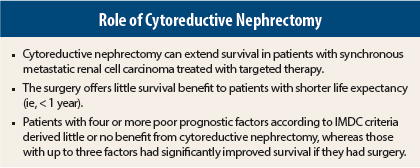Prior to the advent of targeted therapy, cytoreductive nephrectomy was associated with a 6-month improvement in overall survival in patients with metastatic renal cell carcinoma. With new and better targeted therapies for the disease, the appropriate use of cytoreductive nephrectomy has been questioned. A new study from the International Metastatic Renal Cell Carcinoma Database Consortium (IMDC) provides some guidance about which patients with metastatic renal cell carcinoma can expect to have a survival benefit from cytoreductive nephrectomy in the targeted therapy era.
Patients with synchronous metastatic renal cell carcinoma who have a life expectancy of 1 year or more appear to have a survival benefit if treated with targeted therapy and cytoreductive nephrectomy, whereas those with a shorter life expectancy will probably have no benefit, according to the IMDC study, which was presented at the 2014 Genitourinary Cancers Symposium in San Francisco.
Patient Selection
“Not all patients with metastatic renal cell carcinoma should undergo cytoreductive nephrectomy. Patients with longer estimated survival may benefit, but those with four or more risk factors and limited life expectancy should not have this surgery. Of course there may be exceptions to this rule, but this is an interesting approach to patient selection,” said Daniel Y. C. Heng, MD, MPH, FRCPC, an oncologist at Tom Baker Cancer Centre and Clinical Associate Professor at the University of Calgary, Canada.
Two prospective phase III clinical trials are currently evaluating cytoreductive nephrectomy—CARMENA and SURTIME—and results of those should be more definitive than the retrospective analysis that Dr. Heng presented.
The analysis was based on data from consecutive patients treated at 20 international cancer centers with targeted therapy for metastatic renal cell carcinoma (N = 3,245; 2,569 were treated with nephrectomy). After excluding patients who underwent nephrectomy before metastasis occurred, final numbers for the analysis were 982 who had the procedure and 676 who did not.
There were more favorable-risk patients in the cytoreductive nephrectomy group (63% vs 45% in the no nephrectomy group). “This is not surprising because of patient selection criteria for surgery, so we have to adjust results according to baseline characteristics,” Dr. Heng said.
Key Findings
In a univariate analysis of overall survival, the cytoreductive nephrectomy group lived longer: 20.6 vs 9.5 months (adjusted hazard ratio = 0.60 [0.52–0.69], P < .0001).
A multifactorial analysis adjusted for IMDC criteria found an incremental benefit of cytoreductive nephrectomy as survival lengthened, but not much benefit with shorter life expectany. IMDC criteria build on Memorial Sloan Kettering Cancer Center criteria and include Karnofsky performance status < 80%, time from diagnosis < 1 year, and results of four lab tests for anemia, hypercalcemia, neutrophilia, and thrombocytosis.
The study enrolled insufficient numbers of patients to compare cytoreductive nephrectomy vs no nephrectomy in patients who had all six prognostic factors, but a significant survival benefit was detected in those with 0 to 3 prognostic factors, Dr. Heng said.
“If you had one prognostic factor, the difference in median overall survival [favoring cytoreductive nephrectomy] was about 8 months; if you had two factors, the difference was 10 months; and if you had three factors, the difference was 6 months,” Dr. Heng said. ■
Disclosure: Dr. Heng is a consultant or advisor for Bayer, Novartis, and Pfizer. For full disclosures of the study authors, visit abstracts.asco.org.
Reference
1. Heng DYC, Rini BI, Beuselinck B, et al: Cytoreductive nephrectomy (CN) in patients with synchronous metastases from renal cell carcinoma: Results from the International Metastatatic Renal Cell Carcinoma Database Consortium (IMDC). Genitourinary Cancers Symposium. Abstract 396. Presented February 1, 2014.



